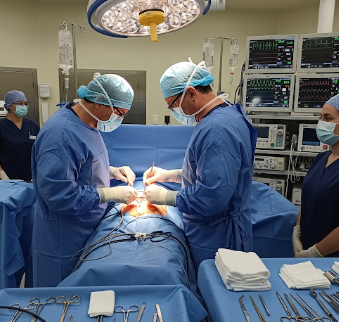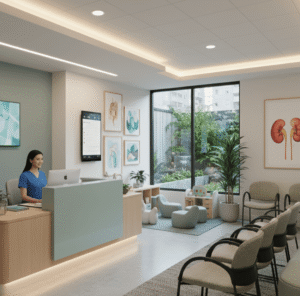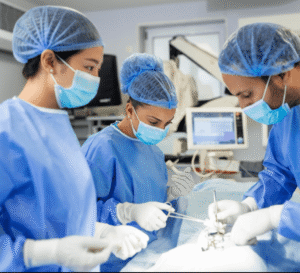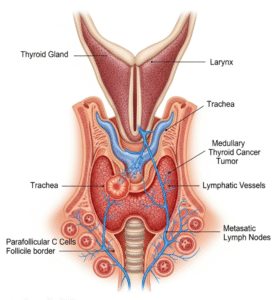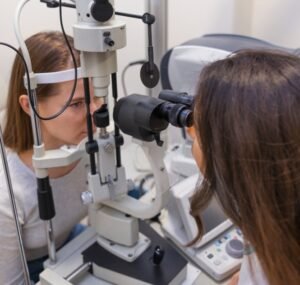What it is
Surgery is a medical procedure involving manual or instrumental techniques to diagnose, treat, repair, or remove part of the body. It can be elective, urgent, or emergency depending on the medical condition.
➡ Key facts:
- ✔ Includes open surgery, minimally invasive laparoscopic surgery, robotic-assisted surgery, and outpatient procedures
- ✔ Can address a variety of conditions such as cancer, heart disease, orthopedic injuries, digestive disorders, and gynecological issues
- ✔ Surgery may involve repairing tissues, removing diseased organs, implanting devices, or reconstructive procedures
- ✔ In Korea, surgeries are performed in highly specialized hospitals, tertiary care centers, and surgical clinics
💡 Surgery is a critical intervention for conditions that cannot be effectively managed by medication or non-invasive treatments.
Why it’s done
Surgery is recommended for:
➤ Diagnosis → Biopsies, exploratory surgery to detect disease
➤ Treatment of illness → Tumor removal, appendectomy, gallbladder removal
➤ Repair of injury → Fractures, torn ligaments, or internal bleeding
➤ Replacement or reconstruction → Joint replacement, heart valve replacement, cosmetic or reconstructive surgery
➤ Emergency situations → Trauma, internal bleeding, or organ rupture
⚠ Delaying surgery for urgent conditions can result in life-threatening complications or permanent damage.
Alternatives
Depending on the condition, alternatives may include:
✔ Medication therapy → To manage symptoms or treat infections
✔ Non-surgical procedures → Endoscopic, catheter-based, or radiological interventions
✔ Physical therapy or rehabilitation → For musculoskeletal injuries
✔ Lifestyle and supportive care → Dietary, exercise, and behavioral interventions for chronic conditions
⚠ While non-surgical alternatives exist, surgery is often the most effective or only definitive treatment for certain conditions.
Preparation
Before undergoing surgery in Korea:
🔹 Medical evaluation → Blood tests, ECG, imaging (X-ray, CT, MRI), and anesthetic assessment
🔹 Medication review → Blood thinners, insulin, or other medications may require adjustment
🔹 Fasting → Usually 6–8 hours before general anesthesia
🔹 Consent and counseling → Risks, benefits, procedure details, and recovery explained
🔹 Preoperative hygiene → Skin cleaning, shaving if necessary
💡 Korean hospitals provide preoperative education including videos, handouts, and consultations to ensure patients understand the procedure and recovery process.
How it’s done
➡ Step-by-step surgical process in Korea:
- Anesthesia → Local, regional, or general depending on the procedure
- Surgical access:
- Open surgery → Traditional incision to access the target area
- Minimally invasive surgery → Laparoscopic or robotic-assisted instruments through small incisions
- Procedure execution → Repair, removal, reconstruction, or implantation
- Hemostasis and closure → Control bleeding, close incision with sutures, staples, or glue
- Immediate postoperative monitoring → Vital signs, bleeding, and anesthesia recovery
💡 Advanced surgical centers in Korea use robotic systems, high-definition imaging, and minimally invasive techniques to improve precision and reduce complications.
Effectiveness & Success Rate
✔ Success depends on type of surgery, patient health, and hospital quality
✔ Korea boasts world-class surgical outcomes, especially in:
- Cardiac surgery (>98% success for bypass and valve replacement)
- Cancer surgery (high survival rates in early-stage procedures)
- Orthopedic surgery (excellent outcomes for joint replacement and spinal procedures)
✔ Minimally invasive and robotic techniques reduce complications, hospital stay, and recovery time
Recovery / Expected Outcomes
✔ Hospital stay: From same-day discharge (minor procedures) to 1–2 weeks (major surgeries)
✔ Activity resumption: Light activity within days; heavier work after weeks
✔ Pain management: Analgesics, ice packs, or epidural medication depending on procedure
✔ Diet and mobility: Gradual reintroduction of food and mobilization
✔ Follow-up: Incision checks, imaging, physical therapy, and rehabilitation as needed
💡 Most patients experience faster recovery and lower complication rates in Korea due to advanced postoperative care and monitoring.
Complications / Risks
⚠ Surgery carries inherent risks including:
➡ Immediate complications:
- Bleeding
- Infection at the surgical site
- Anesthesia-related adverse effects
➡ Intermediate risks:
- Blood clots (DVT or pulmonary embolism)
- Pneumonia or respiratory complications
- Wound healing issues
➡ Long-term risks:
- Scar formation or adhesions
- Organ dysfunction (depending on surgery type)
- Chronic pain or mobility limitations
💡 Korean hospitals mitigate risks with strict sterile protocols, preoperative assessments, and postoperative monitoring.
Treatment Options in Korea (Post-Surgery Care)
🔹 Postoperative monitoring → Vital signs, wound care, infection prevention
🔹 Pain and symptom management → Medications and physical therapy
🔹 Rehabilitation programs → Cardiac rehab, physiotherapy, occupational therapy
🔹 Nutritional support → Tailored diets to promote healing
🔹 Follow-up visits → Imaging, lab tests, and consultations to assess recovery
💡 Korean hospitals integrate multidisciplinary teams including surgeons, nurses, physiotherapists, and dietitians to optimize outcomes.
Top Hospitals & Clinics in Korea for Surgery
🏥 Asan Medical Center (Seoul) – Comprehensive surgical specialties, advanced minimally invasive surgery
🏥 Samsung Medical Center (Seoul) – High-volume cardiac, oncologic, and robotic surgery
🏥 Seoul National University Hospital (SNUH) – Expertise in complex, multi-organ procedures
🏥 Yonsei Severance Hospital – Advanced trauma, orthopedic, and reconstructive surgery
🏥 CHA Bundang Medical Center – Pediatric and adult surgery, including robotic-assisted procedures
Conclusion
Surgery in Korea is safe, effective, and technologically advanced, providing critical treatment for a wide range of conditions.
✔ Wide availability of minimally invasive, robotic, and traditional surgical techniques
✔ Strong emphasis on preoperative preparation, informed consent, and patient education
✔ Advanced postoperative care, rehabilitation, and follow-up ensure excellent outcomes
✔ Korean hospitals consistently achieve high success rates and low complication rates
By offering state-of-the-art surgical care combined with comprehensive pre- and postoperative support, Korea ensures patients receive optimal outcomes, faster recovery, and improved quality of life.

